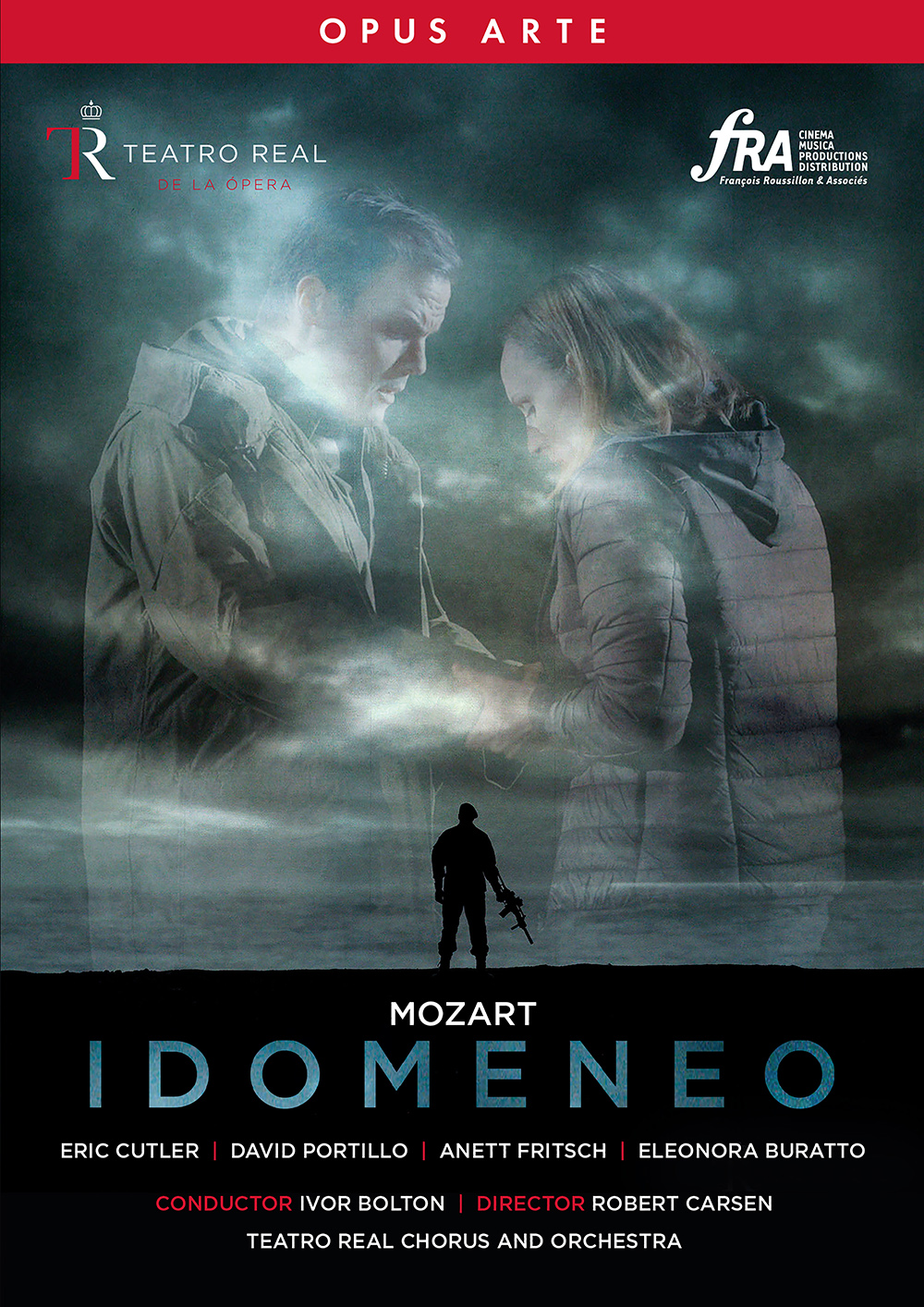Eric Cutler (Idomeneo); David Portillo (Idamante); Anett Fritsch (Ilia); Eleonora Buratto (Elettra); Benjamin Hulett (Arbace); Oliver Johnston (High Priest of Neptune); Alexander Tsymbalyuk (The voice of Neptune)
Mozart’s third venture into ‘opera seria’ demolished the genre’s traditional boundaries and paved the way for lyric drama. Blending youthful earnestness with mature mastery, Mozart uses - while profoundly changing - the elements of a genre based on arias that come one after another with no real concern for dramatic progression. The importance and expressive power of the choruses, influenced by the operatic reforms of Gluck, foreshadows The Magic Flute. Idomeneo is often regarded as Mozart’s first masterpiece for the opera house.
After the fall of Troy, King Idomeneo can finally dream of returning to his homeland after a long absence, during which his son Idamante ensured the continuity of his reign and guarded Trojan prisoners, including Ilia, King Priam’s daughter. To escape from a terrible storm that is keeping him from reaching Crete, Idomeneo promises Neptune to sacrifice the first living being he encounters upon landing. Unfortunately, it is his own son who greets him in his native land. Ilia, by offering her own life in exchange for that of Idamante, whom she loves and who loves her, convinces Neptune to yield and to deliver Idomeneo from his fateful vow.
Robert Carsen’s “politically poetic staging” (Opera News), set in present-day Crete, features a first-rate cast including Eric Cutler as Idomeneo, David Portillo as Idamante, Anett Fritsch as Ilia, Eleonora Buratto as Elettra, and Benjamin Hulett as Arbace.
DVD
BLU-RAY
Ivor Bolton
Orchestra and Chorus of Teatro Real
Eric Cutler; David Portillo; Anett Fritsch; Eleonora Buratto; Benjamin Hulett; Oliver Johnston; Alexander Tsymbalyuk; Orchestra and Chorus of Teatro Real; Ivor Bolton
Conductor Ivor Bolton, Music Director of the house, is a guarantee of success, especially when it comes to Mozart. And he has proved it once again with an excellent, lively reading. The Teatro Real orchestra, as always, was outstanding, and so too was the chorus." (San Francisco Examiner)
"Carsen’s staging ... is full of ... imaginative moments. The Carsen staging makes a strong case for Idomeneo, which many believe is Mozart’s first masterpiece for the opera house.
Eric Cutler sang an ardent, potent Idomeneo. [David] Portillo offered a delicately sung and played Idamante, his finely scaled, piercing lyric voice deployed with elegant command of the Mozart line. Sopranos Anett Fritsch, as Ilia, and Eleonora Buratto, as Elettra, were impeccable princesses: each merited an extended ovation for her key aria, with Buratto’s delivery of Elettra’s death monologue registering as the most powerful moment in the whole opera. The top-notch cast was completed by Benjamin Hulett as Arbace, Oliver Johnston as the High Priest and Alexander Tsymbalyuk as the booming Voice of Neptune." (Opera News)
"Conductor Ivor Bolton, Music Director of the house, is a guarantee of success, especially when it comes to Mozart. And he has proved it once again with an excellent, lively reading. The Teatro Real orchestra, as always, was outstanding, and so too was the chorus." (Seen and Heard International)
"Conductor Ivor Bolton delivers a beautiful reading of intense, focused musicality worthy of the young Colin Davis. The large chorus, standing for rootless humanity in fear of fate and the gods, makes a moving impression and sings very dramatically. Carsen delivers a visual coup in the opera’s final scene when the militia-garbed cast sheds their uniforms to reveal bright civilian dress underneath—optimism prevails tenuously over despair." (Fanfare)
"Both Eric Cutler and David Portillo are well on top of the often difficult music provided for them by Mozart, rising to the more florid passages with relative ease and certainly never overpowered by the tumult that can arise in the orchestra to reflect their emotions and challenges....Full-voiced and emotionally engaged and delivering plenty of punch in her music throughout. She [Frisch] looks good, too, despite her appropriately wretched costumes which seem to consist of cast-offs from various charitable organisations. In her contrastingly smart military uniforms, Eleonora Buratto looks every inch her challenger in the role of Elettra, and her fiery pride finds a believable consummation in her suicide at the end (even though this is not specified by the original libretto); she rises impressively to the coloratura fireworks…" (Musicweb International - Recommended)
"What is...evident right from the overture is that Ivor Bolton is returning the work back to its historically informed period instrumentation, using harpsichord and slightly reduced orchestration that gives it a wholly different feel from the more classical sounding Idomeneo of Mozart. There is consequently a lighter spacious sound with extra delicacy and punch as it hits all the points in the dynamic range. Hearing Mozart this way is always a revelation and the score is lively and percussive in drive but opening up to reveal more detail and beauty in the scoring and playing of individual instruments. Bolton himself plays the recitative accompaniment." (Opera Journal)
Eric Cutler (Idomeneo); David Portillo (Idamante); Anett Fritsch (Ilia); Eleonora Buratto (Elettra); Benjamin Hulett (Arbace); Oliver Johnston (High Priest of Neptune); Alexander Tsymbalyuk (The voice of Neptune)
Mozart’s third venture into ‘opera seria’ demolished the genre’s traditional boundaries and paved the way for lyric drama. Blending youthful earnestness with mature mastery, Mozart uses - while profoundly changing - the elements of a genre based on arias that come one after another with no real concern for dramatic progression. The importance and expressive power of the choruses, influenced by the operatic reforms of Gluck, foreshadows The Magic Flute. Idomeneo is often regarded as Mozart’s first masterpiece for the opera house.
After the fall of Troy, King Idomeneo can finally dream of returning to his homeland after a long absence, during which his son Idamante ensured the continuity of his reign and guarded Trojan prisoners, including Ilia, King Priam’s daughter. To escape from a terrible storm that is keeping him from reaching Crete, Idomeneo promises Neptune to sacrifice the first living being he encounters upon landing. Unfortunately, it is his own son who greets him in his native land. Ilia, by offering her own life in exchange for that of Idamante, whom she loves and who loves her, convinces Neptune to yield and to deliver Idomeneo from his fateful vow.
Robert Carsen’s “politically poetic staging” (Opera News), set in present-day Crete, features a first-rate cast including Eric Cutler as Idomeneo, David Portillo as Idamante, Anett Fritsch as Ilia, Eleonora Buratto as Elettra, and Benjamin Hulett as Arbace.
DVD
BLU-RAY
Ivor Bolton
Orchestra and Chorus of Teatro Real
Eric Cutler; David Portillo; Anett Fritsch; Eleonora Buratto; Benjamin Hulett; Oliver Johnston; Alexander Tsymbalyuk; Orchestra and Chorus of Teatro Real; Ivor Bolton
Conductor Ivor Bolton, Music Director of the house, is a guarantee of success, especially when it comes to Mozart. And he has proved it once again with an excellent, lively reading. The Teatro Real orchestra, as always, was outstanding, and so too was the chorus." (San Francisco Examiner)
"Carsen’s staging ... is full of ... imaginative moments. The Carsen staging makes a strong case for Idomeneo, which many believe is Mozart’s first masterpiece for the opera house.
Eric Cutler sang an ardent, potent Idomeneo. [David] Portillo offered a delicately sung and played Idamante, his finely scaled, piercing lyric voice deployed with elegant command of the Mozart line. Sopranos Anett Fritsch, as Ilia, and Eleonora Buratto, as Elettra, were impeccable princesses: each merited an extended ovation for her key aria, with Buratto’s delivery of Elettra’s death monologue registering as the most powerful moment in the whole opera. The top-notch cast was completed by Benjamin Hulett as Arbace, Oliver Johnston as the High Priest and Alexander Tsymbalyuk as the booming Voice of Neptune." (Opera News)
"Conductor Ivor Bolton, Music Director of the house, is a guarantee of success, especially when it comes to Mozart. And he has proved it once again with an excellent, lively reading. The Teatro Real orchestra, as always, was outstanding, and so too was the chorus." (Seen and Heard International)
"Conductor Ivor Bolton delivers a beautiful reading of intense, focused musicality worthy of the young Colin Davis. The large chorus, standing for rootless humanity in fear of fate and the gods, makes a moving impression and sings very dramatically. Carsen delivers a visual coup in the opera’s final scene when the militia-garbed cast sheds their uniforms to reveal bright civilian dress underneath—optimism prevails tenuously over despair." (Fanfare)
"Both Eric Cutler and David Portillo are well on top of the often difficult music provided for them by Mozart, rising to the more florid passages with relative ease and certainly never overpowered by the tumult that can arise in the orchestra to reflect their emotions and challenges....Full-voiced and emotionally engaged and delivering plenty of punch in her music throughout. She [Frisch] looks good, too, despite her appropriately wretched costumes which seem to consist of cast-offs from various charitable organisations. In her contrastingly smart military uniforms, Eleonora Buratto looks every inch her challenger in the role of Elettra, and her fiery pride finds a believable consummation in her suicide at the end (even though this is not specified by the original libretto); she rises impressively to the coloratura fireworks…" (Musicweb International - Recommended)
"What is...evident right from the overture is that Ivor Bolton is returning the work back to its historically informed period instrumentation, using harpsichord and slightly reduced orchestration that gives it a wholly different feel from the more classical sounding Idomeneo of Mozart. There is consequently a lighter spacious sound with extra delicacy and punch as it hits all the points in the dynamic range. Hearing Mozart this way is always a revelation and the score is lively and percussive in drive but opening up to reveal more detail and beauty in the scoring and playing of individual instruments. Bolton himself plays the recitative accompaniment." (Opera Journal)





























